How to Prepare Kids for International Coding Competitions
How to Prepare Kids for International Coding Competitions
The world is changing fast and coding skills are no longer just a niche talent, they are essential for kids to learn coding. These coding contests for children go beyond writing code. They help build problem-solving skills, critical thinking, and the determination needed for future challenges. If your child wants to compete in international coding competitions for kids like the Bebras Computing Challenge or First Lego League, here’s how to help them succeed
What Exactly is Competitive Coding?
Competitive coding is like a sport for the brain. Students solve complex algorithmic puzzles under time pressure, often using programming languages like Python, Java or Scratch. Unlike classroom projects, coding competitions for kids prioritize efficiency, logic and also encourage creativity. For example, a coding contest for children might ask them to design an app that simplifies recycling or optimize a robot’s path in a deep space exploration mission, applying coding concepts effectively.
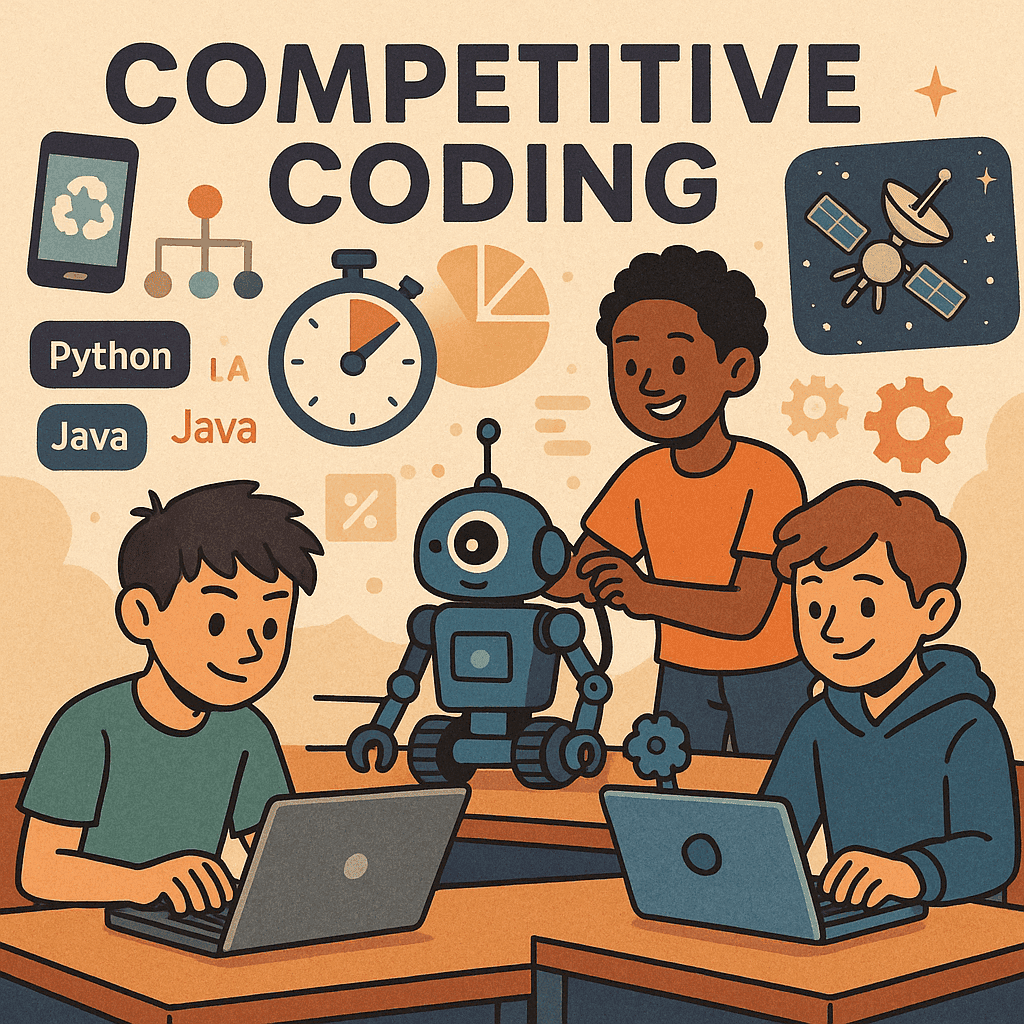
Events like international coding competitions for kids are designed to reflect real-world problems and solve real world problems. World Robot Olympiad, a prominent example of computer science competitions where students create robots to solve environmental challenges or the Congressional App Challenge, which focuses on app development for community issues. By participating in this kind of challenges, kids learn to apply coding concepts like data structures and advanced algorithms in a competitive setting. Such coding contests for children offer valuable experience that aligns with strategies, helping them tackle complex tasks with confidence.
How Can You Prepare Yourself for Coding Competitions
The best way to prepare kids for a coding competition is a combination of structured learning and strategic practice. Here are the initial steps parents can take to support students and students can take:
Do Your Research
Explore international coding competitions for kids that fit your child's skills and interests across different age groups. For younger learners (6–10years old), Scratch coding competitions like those on Code.org are ideal. Older kids may target top contests like the American Computer Science League or the International Olympiad in Informatics.
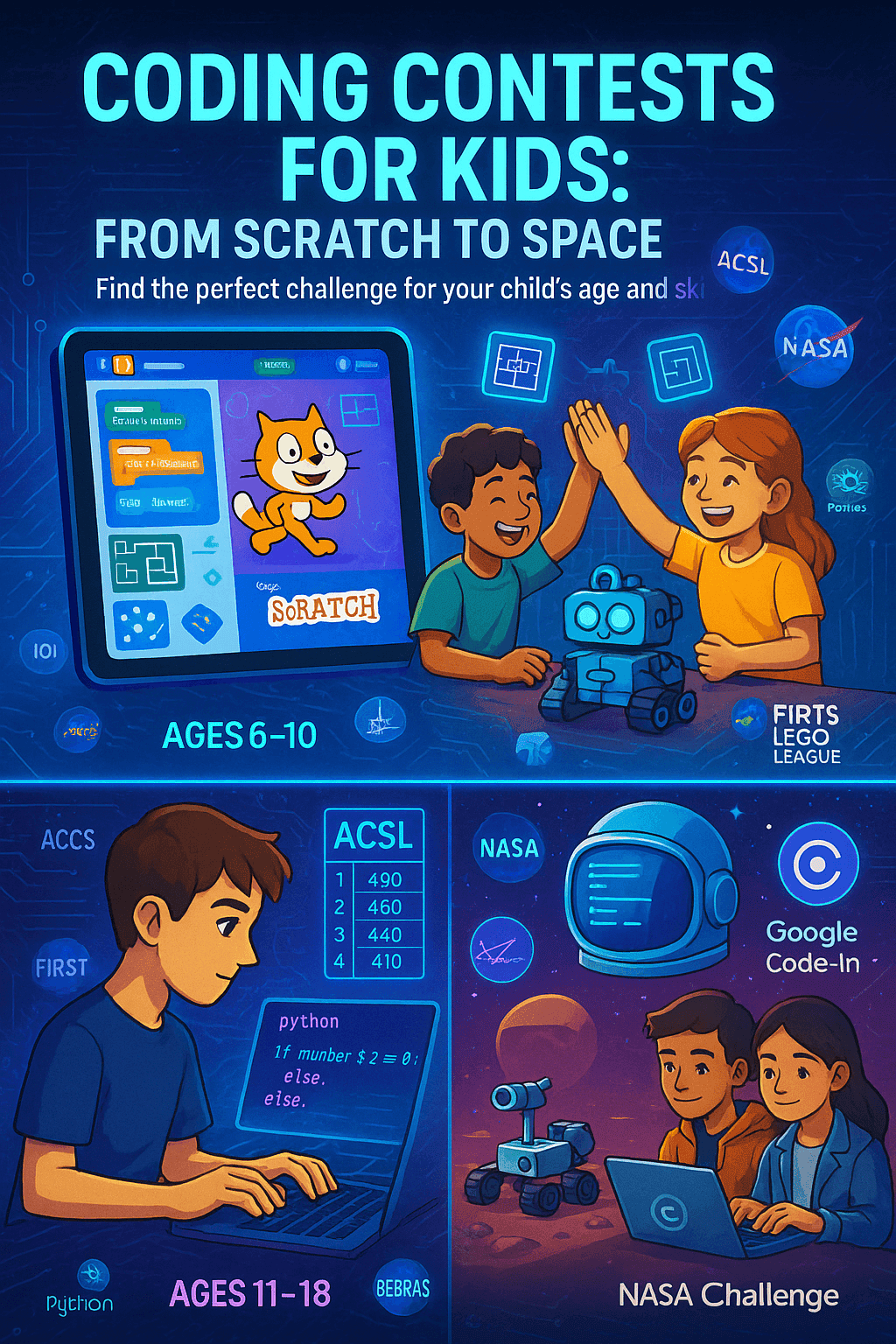
Here are a few top contests where kids can participate and win prizes:
Bebras Computing Challenge: Focuses on computational thinking through puzzles
First Lego League: Combines robotics with creative expression
NASA presents technical problems in some contests, like designing tools for astronauts
Google’s Code-In (ages 13–17) introduces open-source work and technical skills
American Computer Science League(acsl.org) has four contests. They cover theory and coding in Python, Java, or C++
International Olympiad in Informatics, a top international Olympiad for high-level algorithmic challenges
Pick a Programming Language
The right computer language depends on the contest, including prestigious competition designed for various skill levels, and your child’s experience:
Scratch: Perfect for beginners. Many coding classes use it to teach loops and conditionals
Python: Simple syntax makes it great for competitive programming
Java/C++: Used in advanced contests like the international coding competition for high school students
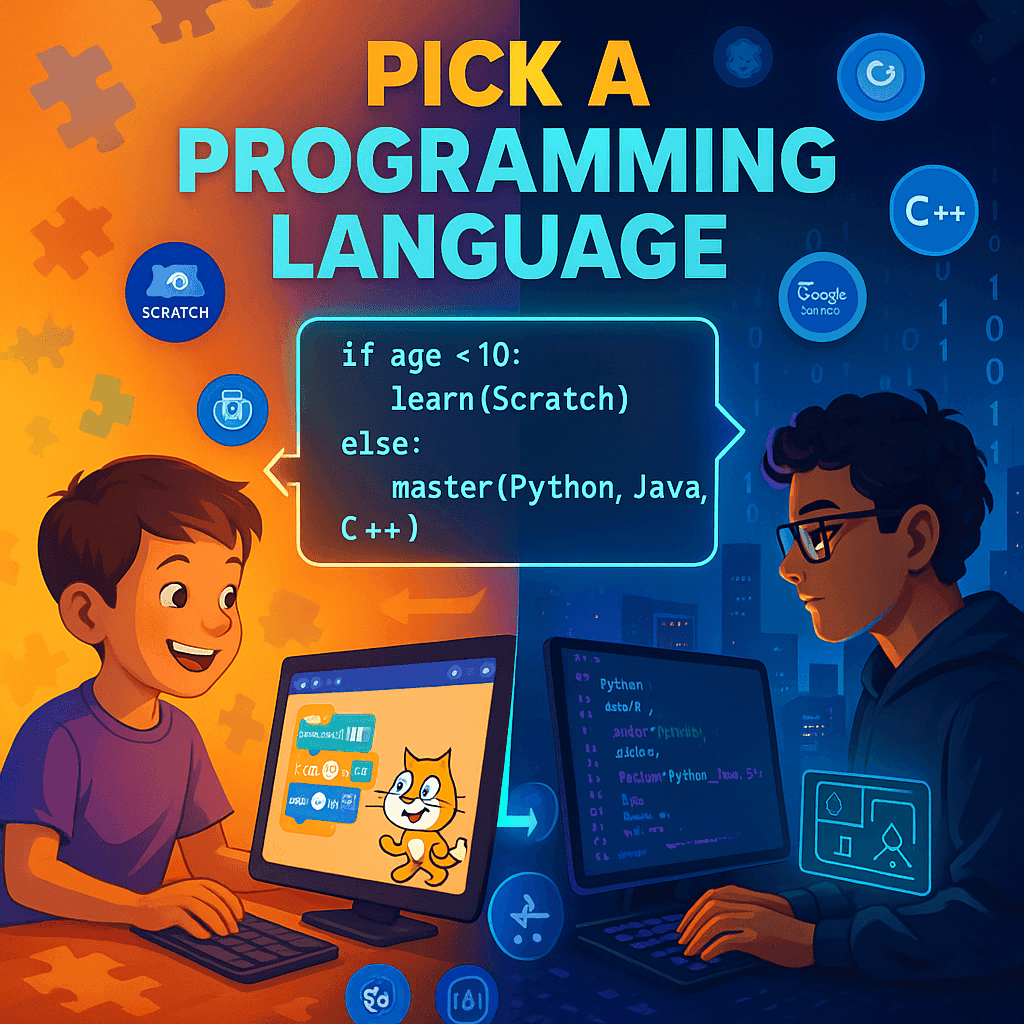
Stick with one language to build consistency. For instance, Scratch coding contests usually stick to one language. But top coding competitions often need participants to be versatile.
Find the Resources Online
Use HackerRank for logic-building or Codeyoung’s courses for coding practice, including interactive stories that will help in international coding competitions for kids.
The National Science Foundation provides free tools, such as Blockly Games for kids.
Code.org provides free, interactive lessons in computational thinking for beginners
HackerRank and LeetCode offer timed challenges on data structures and algorithms. These are great for advanced learners
Coding competition sites like Codeforces and AtCoder simulate real contest environments
Platforms like Codeyoung and Tynker provide guided coding lessons. They also give feedback from skilled teachers
Pick the Right Competition
Not every competition suits every child. Choose contests based on your child’s current skill level and interests and support students in finding the right fit. Look for events that focus on competitions for kids, including coding competitionsfor children, not just professionals.
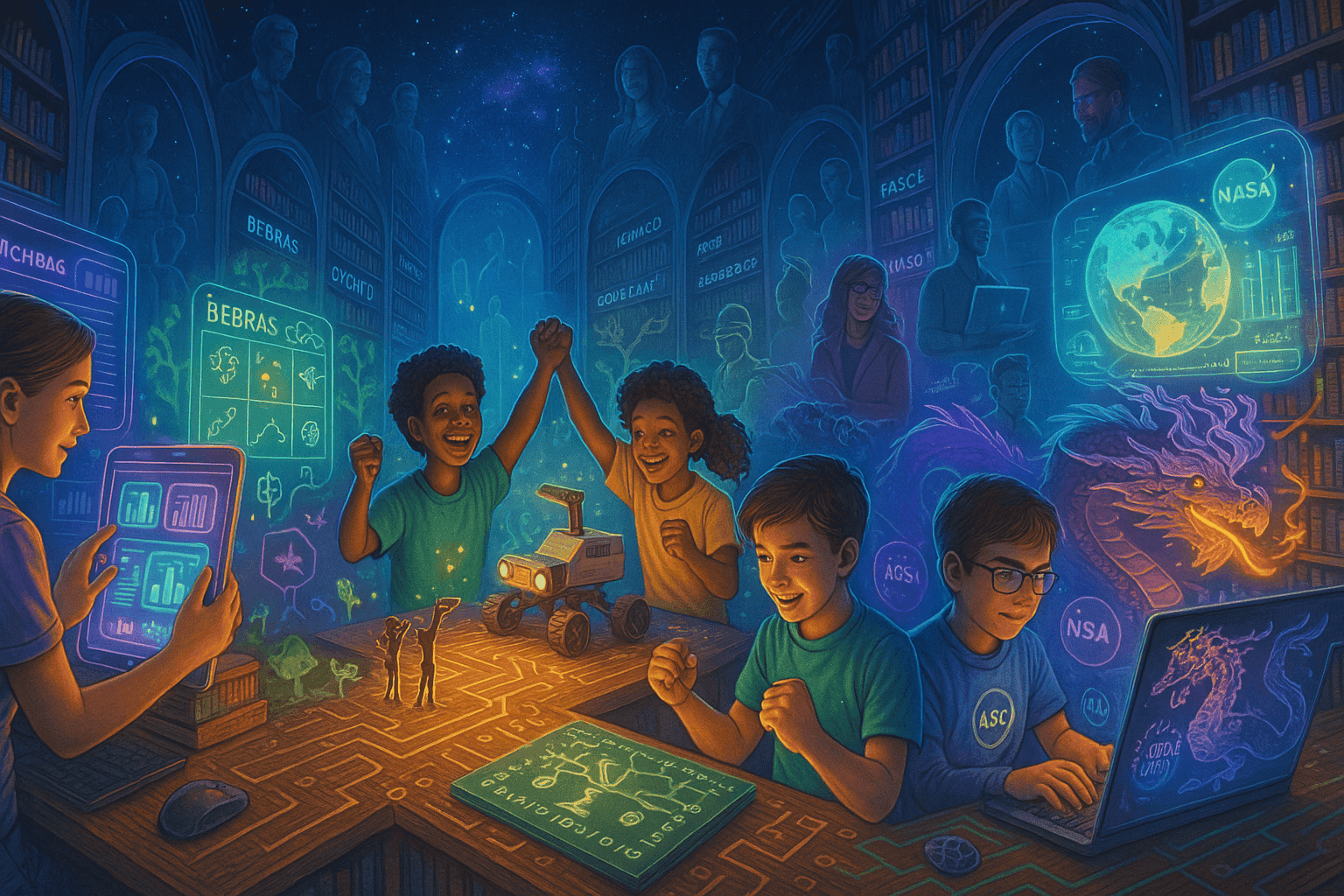
1. Love building apps or games?
If you like designing things, contests like the Congressional App Challenge are great. Try making an app for your community. It could help with a problem you care about. For example, it might be a homework organizer or a fun game that teaches recycling. These international coding competitions for kids let you blend your creative thinking and turn ideas into real projects.
2. Obsessed with solving puzzles?
If you are obsessed with solving puzzles then competitions like the Bebras Computing Challenge is for you. These coding contests for children offer quick and fun challenges. You might find yourself figuring out the fastest route for a robot or decoding a secret message. It’s like a workout for competitive programmers brain and you will level up your problem-solving skills without even noticing.
3. Are you a team player?
If you like working with friends, consider team contests. First Lego League and the World Robot Olympiad are great options. You will build robots and program them for doing certain tasks. These tasks include rescuing a "stranded astronaut" or sorting LEGO blocks. Then, you will compete with teams from other schools or countries. These competitions for kids focus on teamwork and creativity.
4. Coding Ninja?
Already comfortable with programming languages like Python or Java? Join coding competitions like Google’s Code Jam or the American Computer Science League. These contests are like coding Olympics. You will tackle tough problems with data structures and advanced algorithms. But no need to get stressed. Begin with smaller contests, such as the National Robotics Challenge. Next, move to International Olympiad events in a step-by-step manner.
5. Interested in Science?
Explore contests from the National Science Foundation if you like science or experiments. This could be building technology for deep space missions. NASA sometimes shares real challenges or designing tools to tackle climate change. These computer science competitions mix coding with big-picture thinking, perfect for future inventors.
Our Top Tips on Competition Preparation
Once you understand the basics, it’s time to build strong habits and strategies for actual competitions. These international coding competitions for kids are challenging but manageable with the right mindset.
Dissect Questions
Coding competitions often throw complex problems at participants. A common mistake in kids coding competition preparation is misreading the problem statement. So, teach your child to read every word carefully. For example, if a task is about sorting data, they should note limits like time or input size. This method boosts their critical thinking skills. It also helps them grasp what the contest involves.
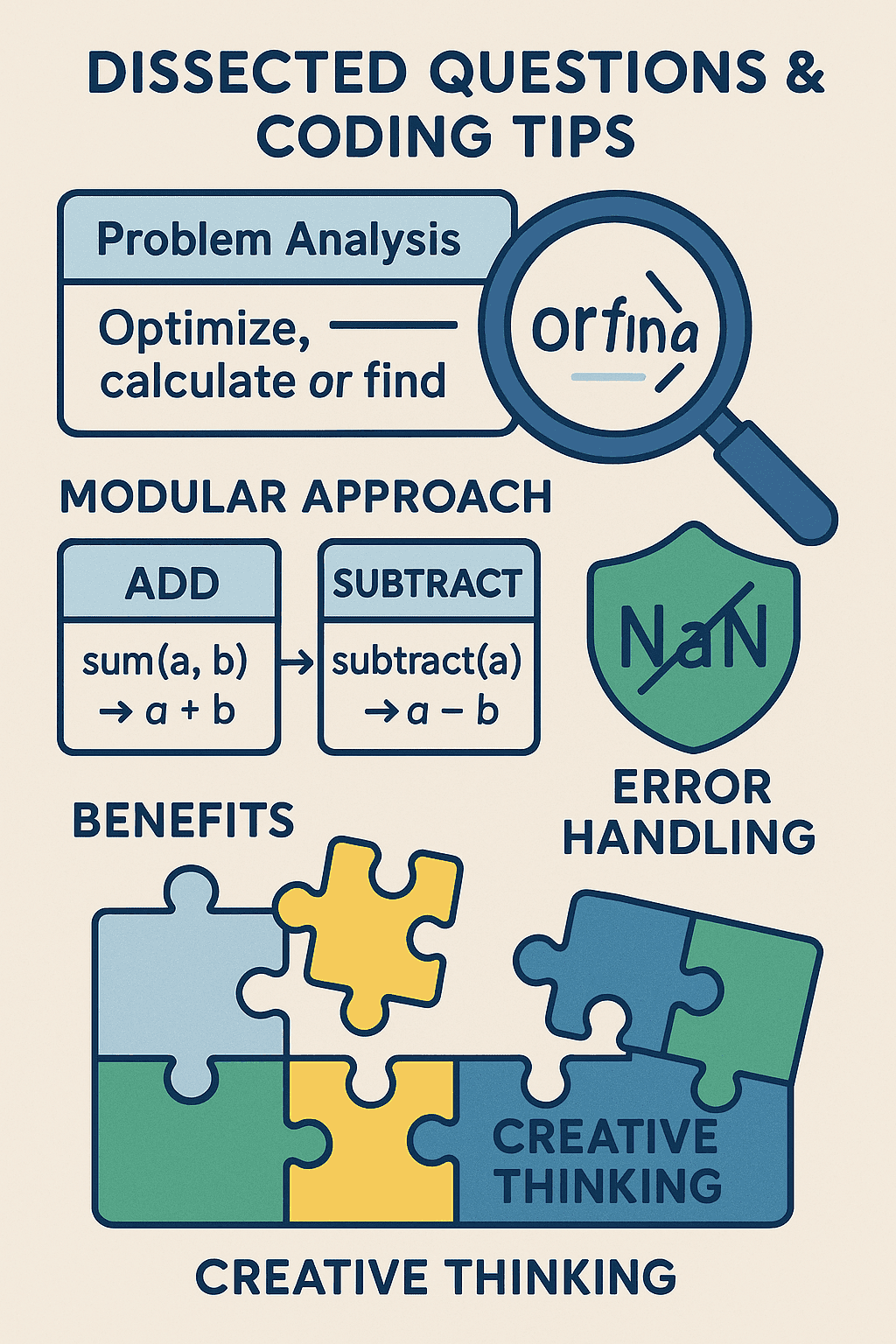
Identify key requirements: Underline words like “optimize,” “calculate” or “find the shortest path”
Break it down: Split the problem into smaller steps
Addition Function: This function takes two numbers and returns their sum
Subtraction Function: This function takes two numbers and returns the difference
Error Handling: This section looks for invalid inputs, like non-numeric values. It also gives clear error messages to help users
This method breaks big tasks into smaller parts. It helps improve coding skills and boosts creative thinking.
Create Skeleton Algorithms
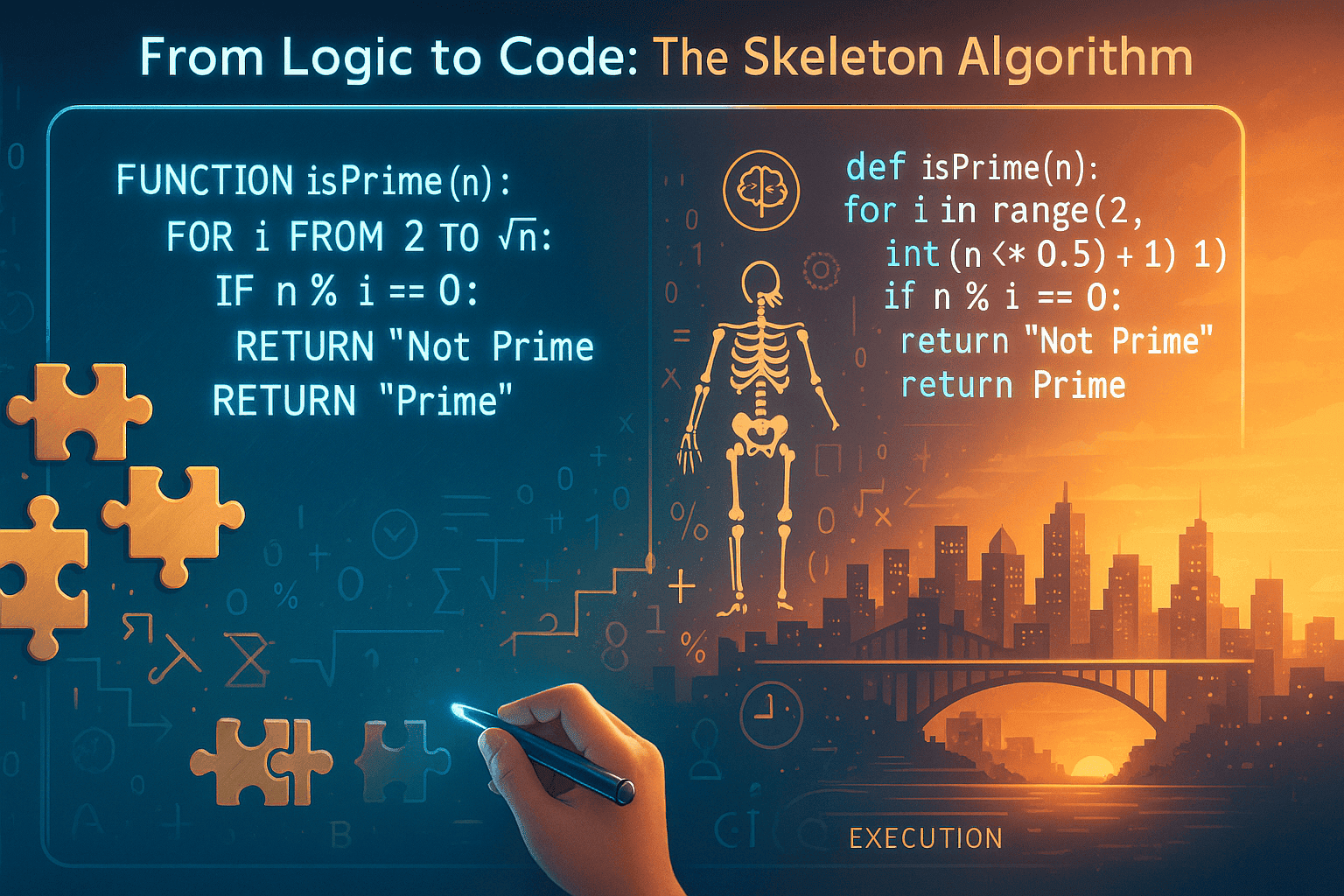
Writing pseudo-code or outlining the logic first saves time and avoids mistakes in logic-heavy problems. Before coding, ask the child to write pseudo-code or outline their ideas. Pseudocode and flowcharts help them see the logic clearly. This practice helps in organizing thoughts and reduces errors in complex problems. For instance, if the task is to find prime numbers, the skeleton might look like:
Take input number
Check divisibility from 2 to square root of the number
Return "prime" if you find no divisors
This step helps your child practice coding skills an learn programming concepts like loops and data structures. This way, they won’t get lost in syntax later.
Do Practice
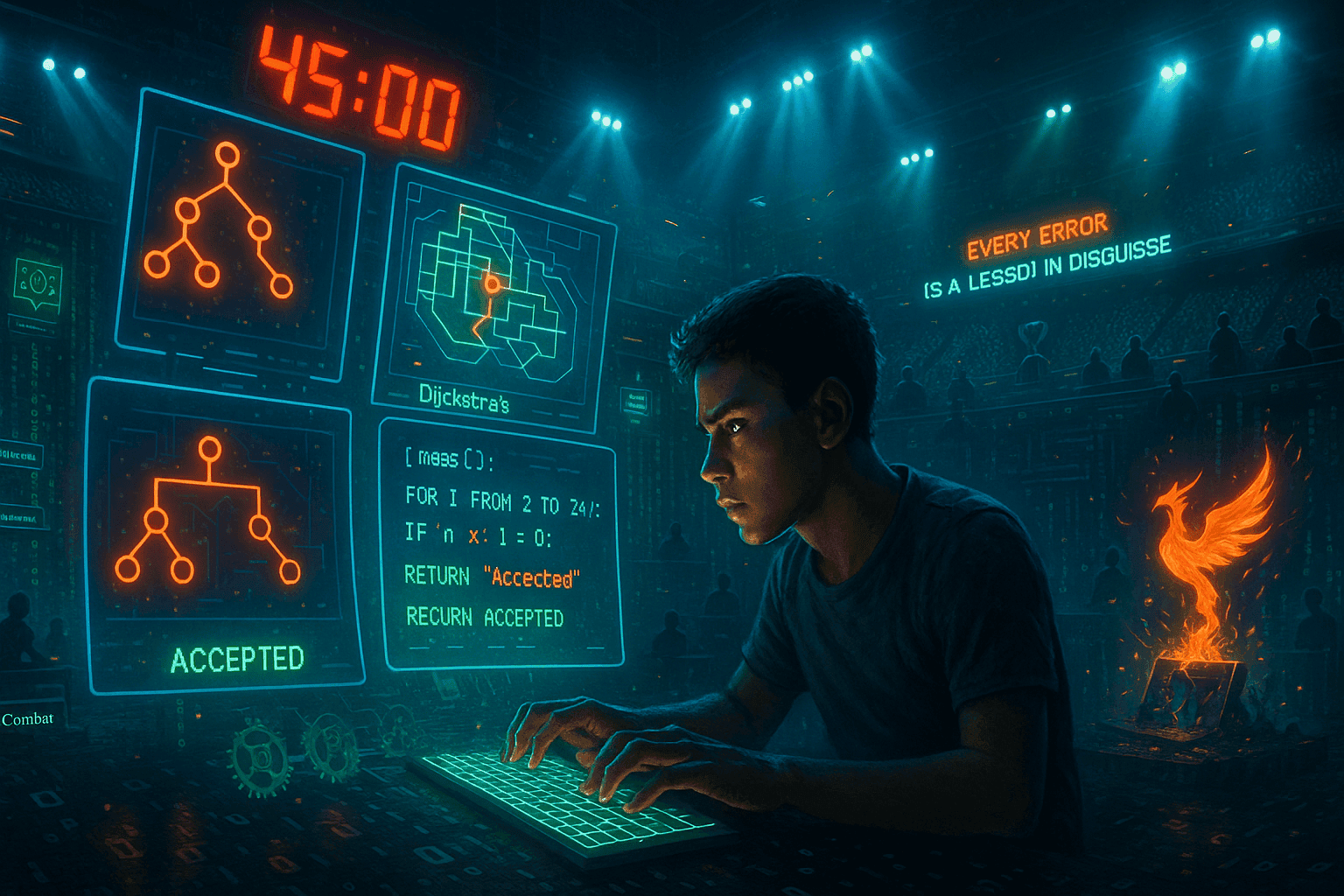
Competitive programming is like a sport, regular drills are essential. Use platforms like CodeCombat, Tynker and Khan Academy. They provide clear paths and coding challenges. These tools strengthen programming skills and help you prepare for coding contests.
Simulate real contests: Set a 45-minute timer for 2 or 3 problems
Review mistakes: Debugging errors improve technical skills
Kids who code every day handle the stress of international competitions better.
Prepare Early and Effectively
International Olympiad-level contests require months of preparation. Start preparing at least 3–6 months ahead of the international coding competition. This timeline allows for deep learning and mastery of technical skills. Preparing early gives you time to explore different computer languages. You can find the one that fits your child's skill level.
Master programming languages like Python or Java
Explore advanced algorithms (e.g. recursion, graph traversal)

Experienced teachers suggest starting with easier contests, like Scratch coding competitions. Then, you can move on to more prestigious events, such as the American Computer Science League.
Practice a Diverse Range of Problems
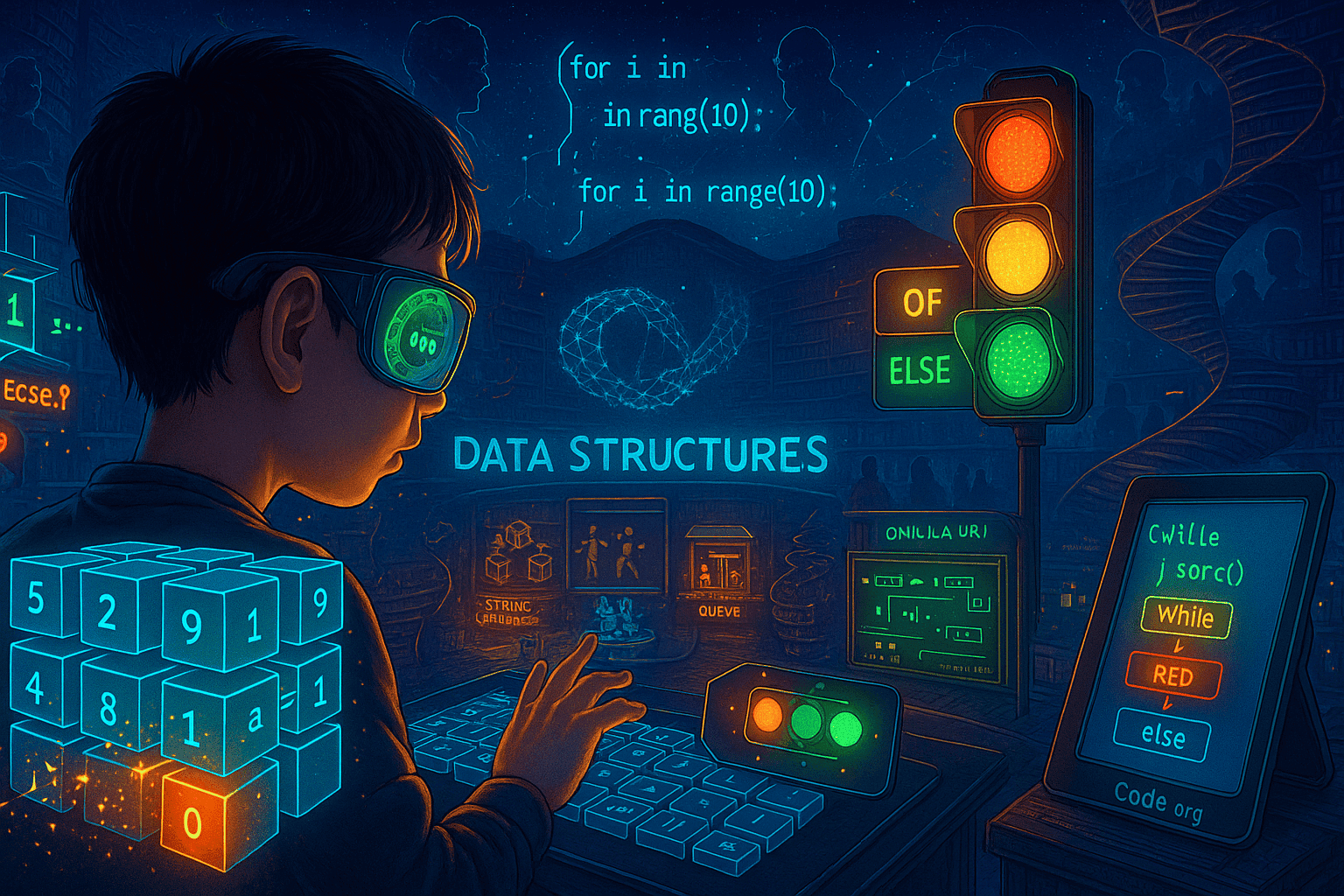
Expose your child to problems on arrays, loops, recursion, and logic. A good coder can manage arrays, strings and puzzles. This variety helps them stay prepared for competitions. Mix practice sessions with:
Data structure problems (e.g. sorting arrays, managing queues)
Real-world problems (e.g. simulating traffic lights, calculating game scores)
Code.org provides educational tools. Young learners can explore various challenges there.
Encourage Collaboration
Collaboration sparks creativity. Pair programming or group study sessions offer significant benefits. Working with friends helps kids learn new skills. They solve problems together and improve faster. It develops creative thinking and helps them understand different approaches to solve problems. Encourage pair programming or group study sessions where kids:
Share debugging tricks
Brainstorm innovative solutions for NASA presents technical problems or deep space exploration missions
Events like First Lego League and World Robot Olympiad encourage teamwork. This makes them great for social learners.
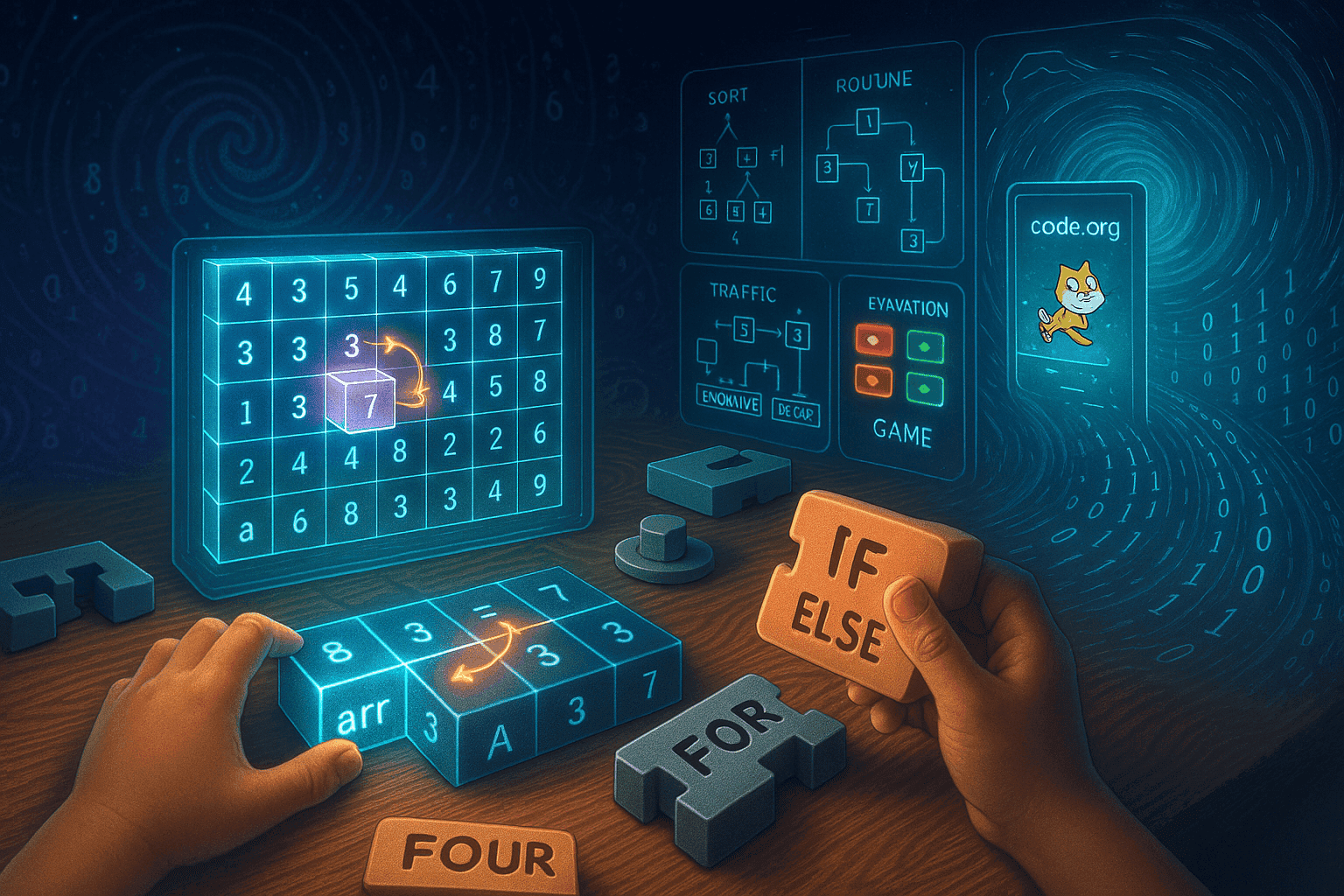
Understand the Competition Environment
Most coding competitions happen online. It's important to know coding platforms, IDEs and time limits. Try to practice some contests before the real one.
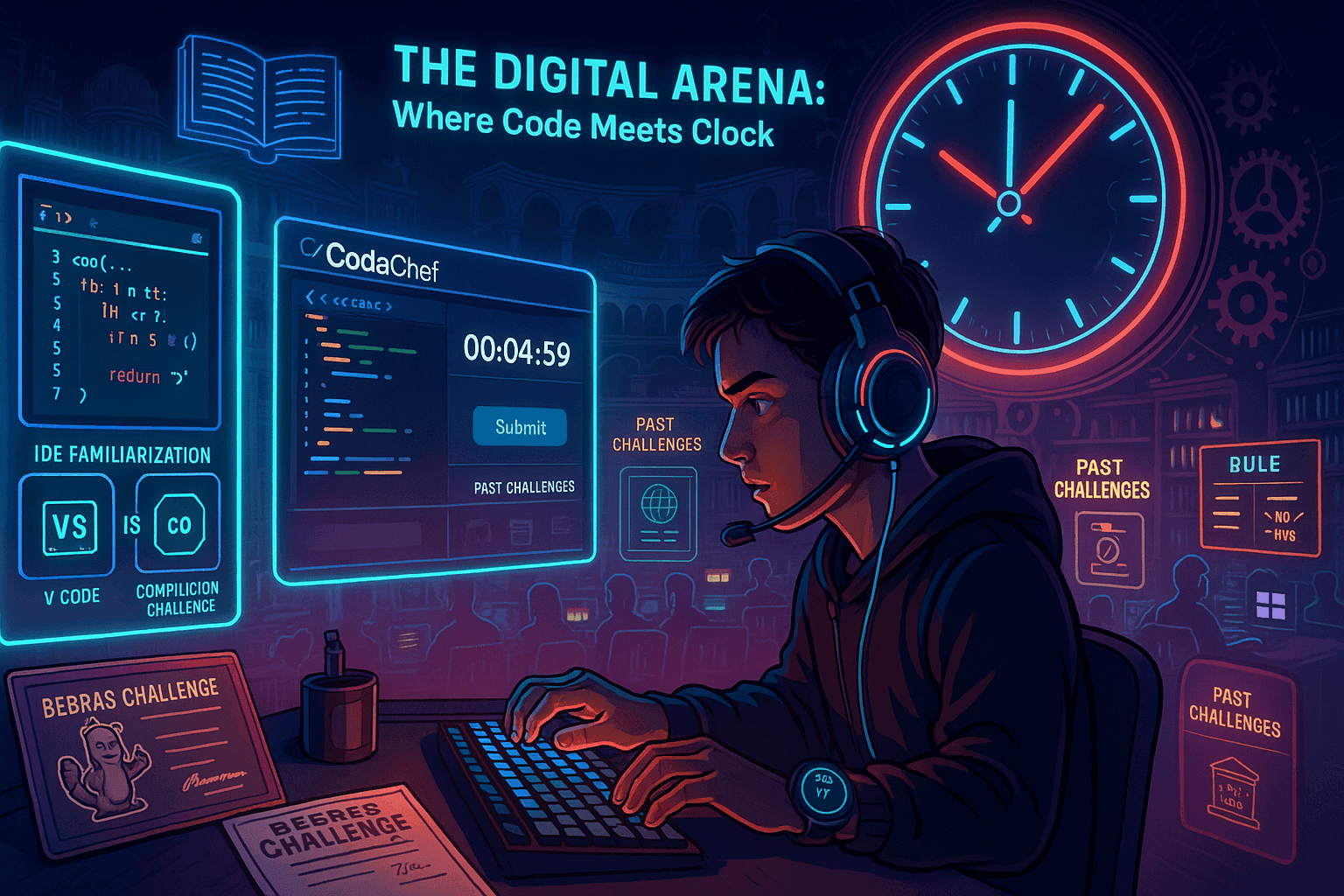
This will help the child feel more at ease in the competition. Understanding the environment reduces anxiety and improves performance. Familiarize the child with:
The competition’s IDE (e.g. CodeChef’s interface)
Submission rules and time limits
Practice contests with past problems from the Bebras Computing Challenge and the Congressional App Challenge.
Remember to Destress
A calm mind solves problems faster. Stress-free mind performs better. Avoid last-minute cramming and ensure they get adequate rest. Before the contest:
Avoid cramming new programming concepts
Practice relaxation techniques, like deep breathing
Tell your child that top coding competitions are great for learning. They are not just about winning prizes.
Use Competitions as a Stepping Stone
Every coding competition is a chance to learn. Win or lose, you always gain something. After the event:
Analyze solutions from other participants
Ask mentors or experienced teachersfor feedback

Skills like critical thinking and creativity will be important for future jobs, and competitions often serve to encourage creativity. This includes areas like app development and robotics.
Conclusion
Preparing for international coding competition for kids helps kids develop more than just coding skills. It also builds critical thinking skills, resilience, creativity and a passion for computer science. With regular practice and early prep, your child can do well in coding competitions. A positive mindset will help them tackle future challenges with confidence.
Start small and celebrate your wins. Remember, every line of code you write today solves real-world problems tomorrow.
International Coding Competitions For Kids– FAQs changes made to h2
What age is ideal for children to start preparing for coding competitions?
Kids aged between 8 to 10 can start with easy coding contests. Popular options include scratch coding competitions for various age groups and the Bebras Computing Challenge. Early exposure builds computational thinking and logic skills. This prepares young learners for advanced contests, like international coding competitions, as they develop. Focus on age-appropriate platforms like Code.org to build confidence.
Which international coding competitions are best for kids?
Notable international coding competitions for kids are:
Bebras Computing Challenge: This one emphasizes computational thinking
Codeavour: It focuses on AI and robotics
Code.org's Hour of Code: This promotes coding education
International Kids Coding Competition (IKCC): It offers various Scratch coding contests
How do I assess if my child is ready for coding competitions?
If your child enjoys coding challenges, completes tasks independently, and manages time well, they are ready. Try free coding competition sites like Code.org. You can also ask experienced teachers to check their skill level. Joining local contests, such as the National Robotics Challenge, is a good test run.
What programming languages should kids focus on for international competitions?
Scratch and Python are great for beginners. They are simple to learn and popular in coding competitions. Learning Java or C++ can help as they progress. Guidance from experienced teachers makes it even better.
How important is problem-solving compared to coding skills in competitions?
Problem-solving skills are crucial in competitive programming. Coding skills, including strong coding skills, are important, but strong problem-solving skills matter more. They often decide who wins in computer science competitions.
Are there any online platforms to help kids prepare for these contests?
Yes, platforms like Code.org and Codeyoung help beginners learn coding. HackerRank is great for teens, while LeetCode is for advanced learners. They all provide resources to practice coding and improve programming skills. These platforms offer many coding competitions and coding challenges for all ages and skill levels.
Comments
Your comment has been submitted